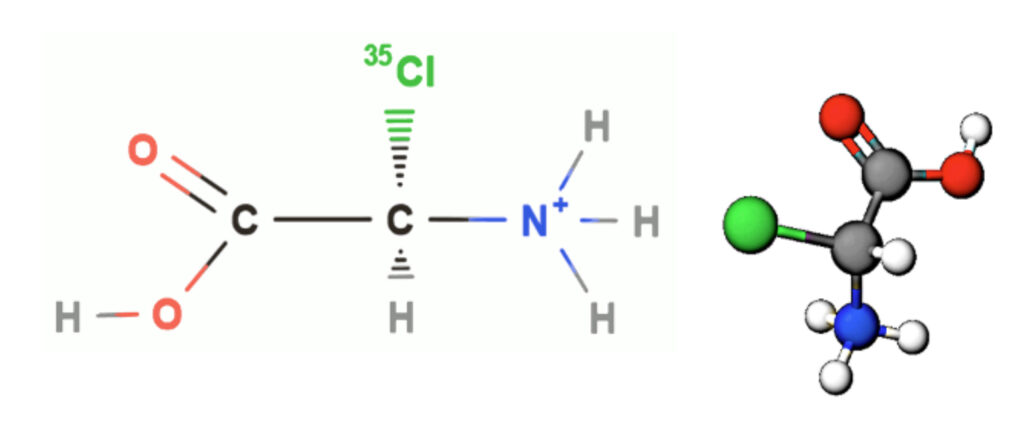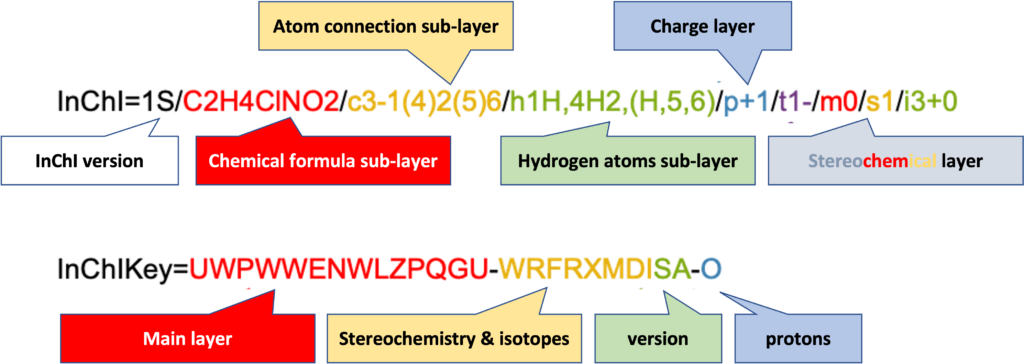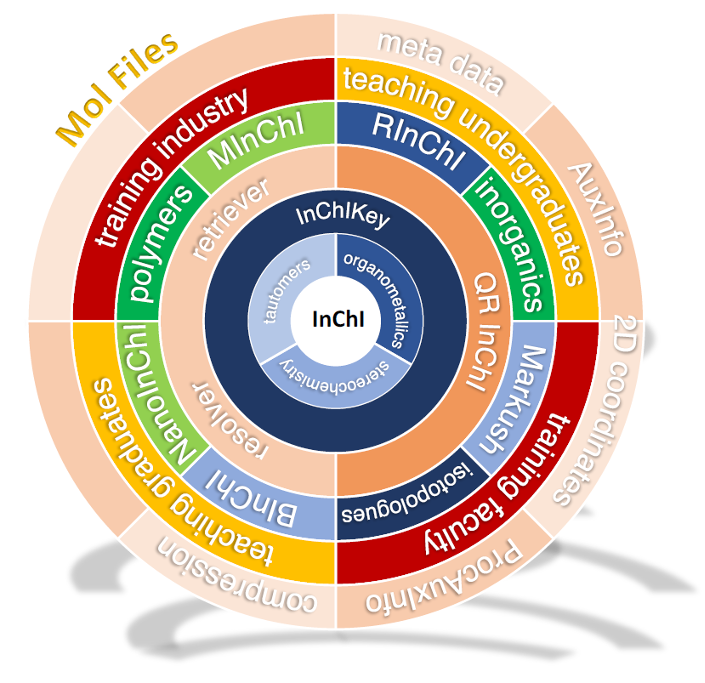Welcome to InChI
InChI
The International Chemical Identifier
InChI is a structure-based chemical identifier, originally developed by IUPAC. As a standard identifier for chemical databases, InChI is essential for enabling effective information management across chemistry.
InChI with InChIKey are non-proprietary open standards. InChI turns chemical structures into unique machine readable strings, used for describing, storing and searching chemical structures. All associated algorithms and software are open source.
What is InChI and InChIKey?
InChI identifiers describe chemical substances in terms of layers of information – the atoms and their bond connectivity, tautomeric information, isotope information, stereochemistry and electronic charge. The InChIKey is a fixed length (27 character) condensed digital representation of the InChI that is not designed to be human-understandable.
InChI is a structure-based identifier, strictly unique, and non-proprietary, open source and freely accessible.


InChIKey is a hashed version of InChI which allows for a compact representation and for searching in standard search engines like Google.
Where are InChI and the InChIKey used?
InChI is used by most of the large chemical databases and software applications handling many millions of chemical structures.
InChI enables the linking and interlinking of chemistry and chemical structures on the web and computer platforms. By enhancing the discoverability of chemical structures, InChI advances the ‘FAIR Guiding Principles for scientific data management and stewardship’. FAIR was published in 2016 to provide guidelines to improve the Findability, Accessibility, Interoperability, and Reuse of digital assets. InChI provides ‘Findability’ for chemical structures and extends Interoperability between platforms, both of which foster Accessibility and Reuse!
Laboratory Information Systems

InChIKeys are used to integrate chemical data across other types of data in a research laboratory. This can include safety information, chemical properties, inventory, disposal, toxicity, etc.
Identifier for Corporate Chemical Registries

InChIKeys are often used as the primary chemical identifier to create a chemical inventory for single site. Additionally InChIKeys are being used for complex inventories spanning multiple sites and research laboratories.
Integrating – Chemical and Biological Data

Integrating chemical and biological databases is a critical operation for many organizations. InChIKeys can be used to provide the link between databases which contain information on chemicals as well as biological and many other types of data.
Search InChIKey in Google and Other Tools

Google has implemented the use of InChIKey for queries. An InChIKey can simply be embedded in a Google query to find all of the information on a chemical. This includes most patents and a broad set of additional related chemical data.
InChI in Education (OER)

The InChI Open Education Resource (OER) is devoted to the use of InChI. Chemical nomenclature underpins chemical communication and InChI supports the advancement of chemical nomenclature into the digital age. InChI is evolving to handle reactions, mixtures and other needs of 21st century scientific communication, and yet there is little educational material available on the use of InChI. OER provides InChI related resources to assist practicing scientists and educators in learning about and benefiting from the use of InChI.
Directions and Priorities

The InChI Membership Program provides direction and priorities for the project. The code is maintained by a broad group of supporters from industry, government and academia and is contributed to the InChI Trust. There are about a dozen Working Groups extending InChI in many different areas of chemistry (nanomolecules, polymers, organometallics, Markush, etc.). We also support some paid software development for integrations across areas (like stereochemistry or tautomers).
The InChI Trust
The InChI Trust is a UK Public Benefit Charity. It was created to oversee the InChI Standard and provide the creation and delivery of new versions and formal releases. The Trust operates on a very limited budget from the fees paid by the InChI Members. There are three part-time staff at the Trust who focus on release management and outreach. The staff reports to the Board of Directors who report to the InChI SubCommittee of IUPAC.
The majority of the work on the InChI Standard is defining and coding enhancements and revisions of the InChI code base. This effort and the resulting code is donated to the InChI Trust by a broad community of developers and users. The Trust also maintains the open-source code repository and oversees the testing of changes and additions. The Trust also organizes frequent InChI community discussion groups to consider potential changes and suggest new directions for the InChI Standard.
The actual design and development of the various tools and capabilities that comprise the InChI code are done by the InChI Working Groups which are made up of staff from the InChI community. These voluntary groups are each focused on specific areas of chemistry or tools within the InChI code. See Working Groups for details on each group and their membership. The work on the InChI code itself is contributed as fully open-source code to the project.
Latest InChI News (view all InChI news)
March 27, 2023: InChI Mentioned in C&EN Article
InChI is mentioned by Greta Heydenrych, Executive Director of IUPAC, in an interview in today's issue of C&E News. Dr. Heydenrych was asked what sectors of chemistry are precipitating the most changes? She replied "materials science, supramolecular chemistry . . . and our work on establishing digital representations of compounds, such as that with the InChI [International Chemical Identifier] Trust, and development of other digital standards . . .â€
March 2, 2023: Sonia Herres-Pawlis Appointed to the InChI-Trust Board of Directors
Congratulations Sonia Herres-Pawlis who joins the InChI-Trust Board of Directors. Dr Herres-Pawlis is on the faculty at Aachen University. Her research interests include Oxidation and Polymerisation Catalysis, Bioinorganic Chem, Green Chem and general Inorganic Chem.
December 19, 2022: Planning InChI Activities for 2023
We are planning to participate in several conferences in 2023 as well as hold at least two events. We expect to participate in BioIT World sessions, both ACS meetings and probably another one or two. In addition we are planning a mostly in-person event in Cambridge UK in the spring and adjacent to the San Francisco ACS meeting in August. Details will follow early next year.
Happy New Year!
Our newsletter, InChI OUTREACH, will be published on a regular basis every 3 to 4 months. We will include the latest news, topics of interest, discussions on various aspects of InChI. To view and download the the latest issue click here.










